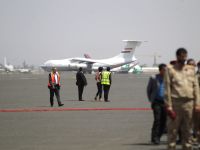Lebanon has the third-least-competitive cellular market in the Arab world after war-ravaged Syria and Libya, a clear indication that the country has made no real effort to modernize this vital sector.
The Arab Advisors Group’s Cellular Competition Intensity Index for 2015 ranked Lebanon in 17th place among 19 countries in the Arab world, unchanged from the 2014 index, but up from 19th place in 2013.
Even impoverished Mauritania performed better than Lebanon, ranking 14th in this year’s index for the Arab world. The report was carried by Lebanon This Week, the economic publication of the Byblos Bank Group.
Lebanon was among seven countries whose rankings were unchanged from the 2014 index, along with Saudi Arabia, Jordan, Palestine, Iraq, Tunisia and Mauritania.
The rankings of Bahrain, Kuwait, Yemen, the UAE and Libya improved year-on-year, while those of Egypt, Morocco, Oman, Algeria, Sudan, Qatar and Syria regressed from the 2014 index.
Lebanon received a score of 41.83 percent in 2015, up from 40.76 percent in 2014, 40.71 percent in 2013 and 38.84 percent in 2012, but significantly below the regional average of 59.4 percent.
Lebanon’s score increased by 1.07 percentage points and posted the fifth-lowest increase regionally. All Arab countries posted increases in their 2015 score.
The Arab Advisors Group considered Saudi Arabia as having the most competitive cellular market in the region as it hosts four operational and licensed mobile network operators in addition to two mobile virtual network operators. It also offers smartphone plans, corporate offers, 4G LTE services and international long-distance competition.
In contrast, it viewed the Lebanese cellular market as a duopoly as it hosts two operators with a market share split of around 47 percent to 53 percent. It added that Lebanon offers 13 prepaid plans and eight postpaid plans, in addition to smartphone plans, corporate offers and 3G/4G LTE services. Lebanon, along with the UAE, Qatar and Syria have a duopoly cellular market, with the four countries ranking at the bottom of the index.
The index uses a relative approach, as it rates the intensity level of competition in the region’s cellular markets by comparing the state of every market relative to the other markets. “As such, even if a market’s absolute level of competition improved, its score on the index will also depend on how other markets developed during the same period of time,” the report added.
The index, designed by the Arab Advisors Group, takes into account nine categories, with each category assigned a weight based on its importance as an indicator of competitive behavior.
The categories include the number of licensed and expected operators in 2015, the number of working operators, the market share of the largest operator, the number of prepaid plans, the number of postpaid plans, the availability of smartphone plans, the availability of corporate offers, the availability of 3G/4G LTE services and the availability of international long distance competition.








